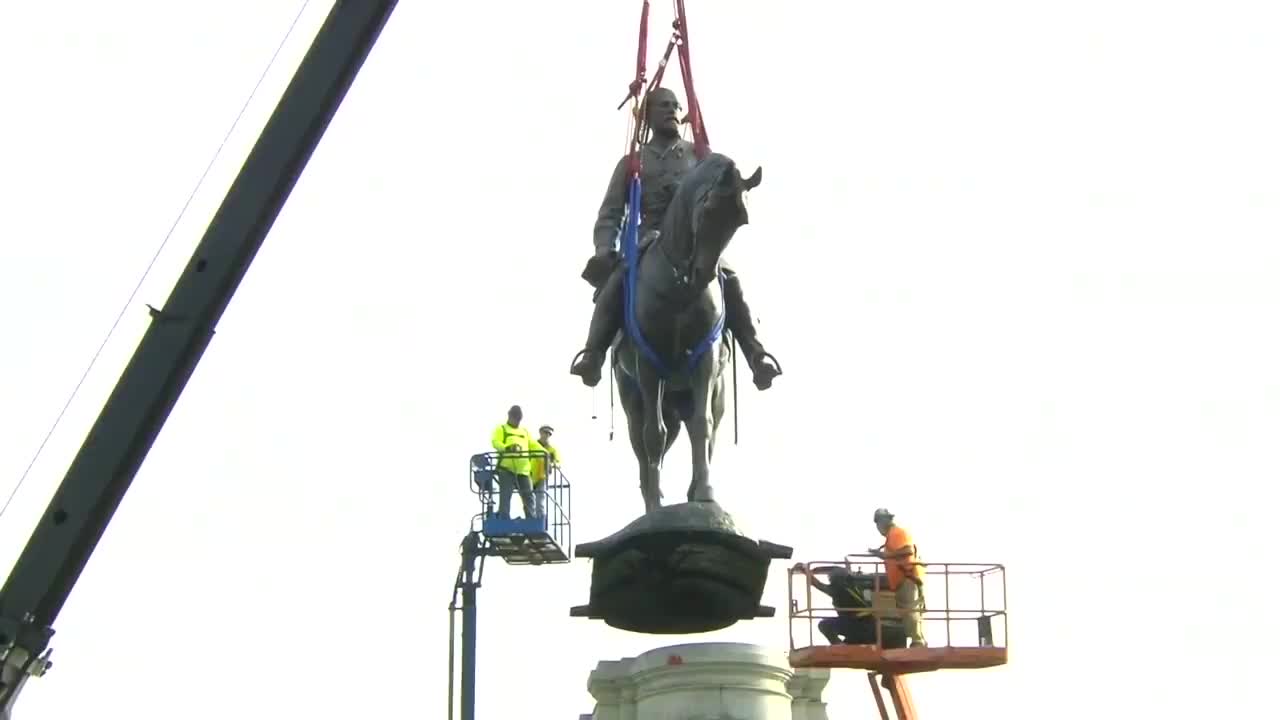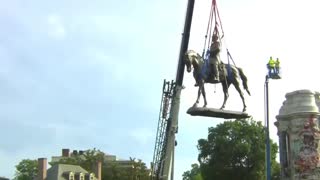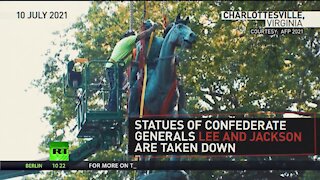Premium Only Content

Robert E. Lee statue is removed from Monument Avenue in Richmond
Robert E. Lee statue is removed from Monument Avenue in Richmond as the crowd frenetically cheers the moment.
A son of Revolutionary War officer Henry "Light Horse Harry" Lee III, Lee was a top graduate of the United States Military Academy and an exceptional officer and military engineer in the United States Army for 32 years. During this time, he served throughout the United States, distinguished himself during the Mexican–American War, and served as Superintendent of the United States Military Academy. Lee married Mary Anna Custis Lee, adopted great-granddaughter of George Washington. When Virginia's 1861 Richmond Convention declared secession from the Union, Lee chose to follow his home state, despite his desire for the country to remain intact and an offer of a senior Union command. During the first year of the Civil War, he served in minor combat operations and as a senior military adviser to Confederate President Jefferson Davis.
Lee took command of the Army of Northern Virginia in June 1862 during the Peninsula Campaign following the wounding of Joseph E. Johnston. He succeeded in driving the Union Army of the Potomac under George B. McClellan away from the Confederate capital of Richmond during the Seven Days Battles, although he was unable to destroy McClellan's army. Lee then overcame Union forces under John Pope at the Second Battle of Bull Run in August. His invasion of Maryland that September ended with the inconclusive Battle of Antietam, after which he retreated to Virginia. Lee then won two decisive victories at Fredericksburg and Chancellorsville before launching a second invasion of the North in the summer of 1863, where he was decisively defeated at the Battle of Gettysburg by the Army of the Potomac under George Meade. He led his army in the minor and inconclusive Bristoe Campaign that fall before General Ulysses S. Grant took command of Union armies in the spring of 1864.
Grant engaged Lee's army in bloody but inconclusive battles at the Wilderness and Spotsylvania before the lengthy Siege of Petersburg, which was followed in April 1865 by the capture of Richmond and the destruction of most of Lee's army, which he finally surrendered to Grant at Appomattox Court House.
In 1865, Lee became president of Washington College (later Washington and Lee University) in Lexington, Virginia; in that position, he supported reconciliation between North and South. Lee accepted "the extinction of slavery" provided for by the Thirteenth Amendment, but opposed racial equality for African Americans. After his death in 1870, Lee became a cultural icon in the South and is largely hailed as one of the Civil War's greatest generals. As commander of the Army of Northern Virginia, he fought most of his battles against armies of significantly larger size, and managed to win many of them
A son of Revolutionary War officer Henry "Light Horse Harry" Lee III, Lee was a top graduate of the United States Military Academy and an exceptional officer and military engineer in the United States Army for 32 years. During this time, he served throughout the United States, distinguished himself during the Mexican–American War, and served as Superintendent of the United States Military Academy. Lee married Mary Anna Custis Lee, adopted great-granddaughter of George Washington. When Virginia's 1861 Richmond Convention declared secession from the Union, Lee chose to follow his home state, despite his desire for the country to remain intact and an offer of a senior Union command. During the first year of the Civil War, he served in minor combat operations and as a senior military adviser to Confederate President Jefferson Davis.
Lee took command of the Army of Northern Virginia in June 1862 during the Peninsula Campaign following the wounding of Joseph E. Johnston. He succeeded in driving the Union Army of the Potomac under George B. McClellan away from the Confederate capital of Richmond during the Seven Days Battles, although he was unable to destroy McClellan's army. Lee then overcame Union forces under John Pope at the Second Battle of Bull Run in August. His invasion of Maryland that September ended with the inconclusive Battle of Antietam, after which he retreated to Virginia. Lee then won two decisive victories at Fredericksburg and Chancellorsville before launching a second invasion of the North in the summer of 1863, where he was decisively defeated at the Battle of Gettysburg by the Army of the Potomac under George Meade.
He led his army in the minor and inconclusive Bristoe Campaign that fall before General Ulysses S. Grant took command of Union armies in the spring of 1864. Grant engaged Lee's army in bloody but inconclusive battles at the Wilderness and Spotsylvania before the lengthy Siege of Petersburg, which was followed in April 1865 by the capture of Richmond and the destruction of most of Lee's army, which he finally surrendered to Grant at Appomattox Court House.
In 1865, Lee became president of Washington College (later Washington and Lee University) in Lexington, Virginia; in that position, he supported reconciliation between North and South. Lee accepted "the extinction of slavery" provided for by the Thirteenth Amendment, but opposed racial equality for African Americans. After his death in 1870, Lee became a cultural icon in the South and is largely hailed as one of the Civil War's greatest generals. As commander of the Army of Northern Virginia, he fought most of his battles against armies of significantly larger size, and managed to win many of them.
For our Videos search Rumble with: OPFREEDOM
Follow us on Telegram t.me/OPFREEDOM
Follow us on Gab TV tv.gab.com/channel/opfreedom
Follow one of our Patriots on TikTok
https://vm.tiktok.com/ZMdcg5GBJ/
🇺🇲🇺🇲🇺🇲🇺🇲
PLEASE SUPPORT US - WE WILL DONATE 22% TO OUR VETERANS IN NEED
https://operation-freedom-3.creator-spring.com/
🇺🇲🇺🇲🇺🇲🇺🇲🇺🇲
-
 2:05:31
2:05:31
Op Freedom
1 year agoWhat's Really Coming: A Counterfeit Beast System and a Real Great Deception - Q - Trump
28.6K80 -
 1:33
1:33
Sharyl Attkisson
3 years agoCrowd Cheers as Robert E. Lee Statue is Removed in Richmond
52910 -
 1:33
1:33
Dinesh D'Souza
3 years agoWoke Crowd Cheers As Robert E. Lee Statue Is Removed In Richmond, Virginia
10.9K249 -
 0:35
0:35
Just the News
4 years agoStatue of Robert E. Lee removed from U.S. Capitol
15.7K66 -
 1:59
1:59
WMAR
3 years agoCapt. O'Donnell statue removed from Canton
202 -
 2:14
2:14
The Post Millennial Live
3 years agoWorkers removing Richmond's statue of Robert E. Lee
299 -
 3:08
3:08
RT
3 years agoEnd of a bitter battle | Robert E. Lee statue to be removed for being 'a symbol of racial injustice'
828 -
 0:20
0:20
Newsy
4 years agoRichmond, Virginia, Robert E. Lee Statue To Stay Standing For Now
6881 -
 2:28
2:28
Newsy
3 years agoStatue Of Confederate Robert E. Lee Taken Down In Virginia
1.36K27 -
 1:04:55
1:04:55
Bare Knuckle Fighting Championship
3 days agoBKFC ITALY PRESS CONFERENCE | LIVE!
25.8K1